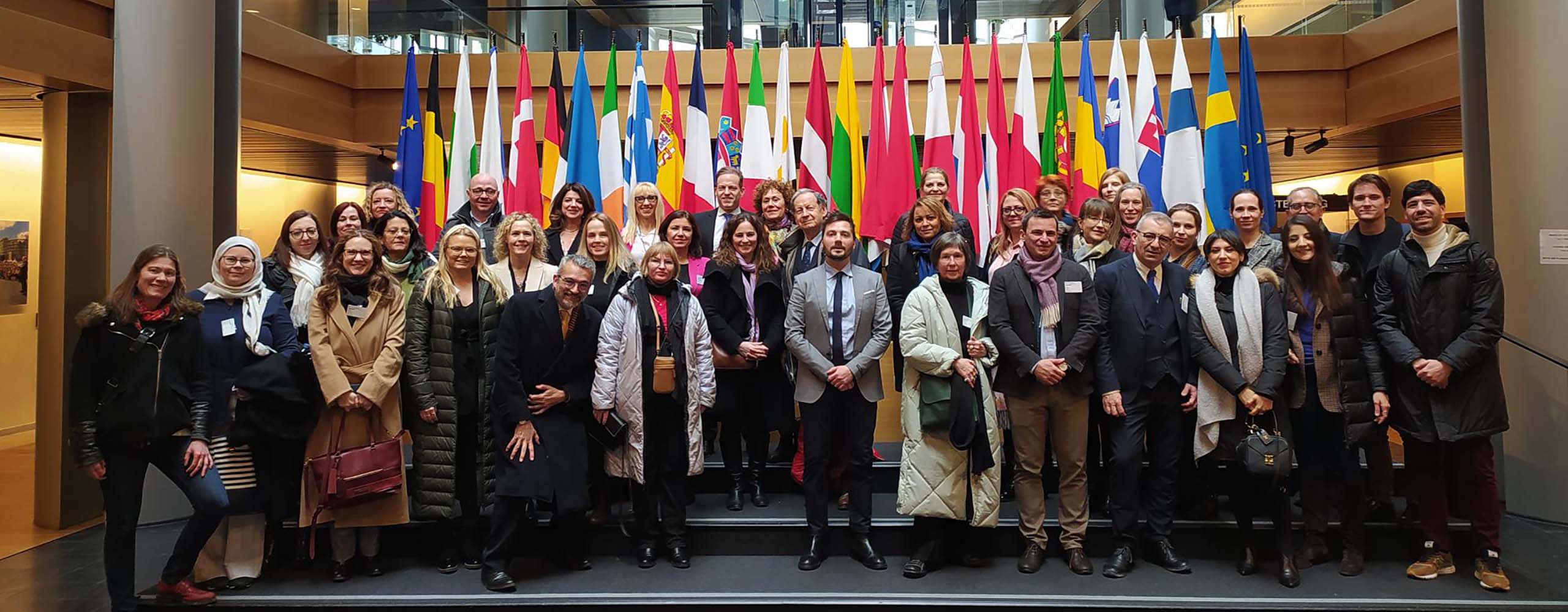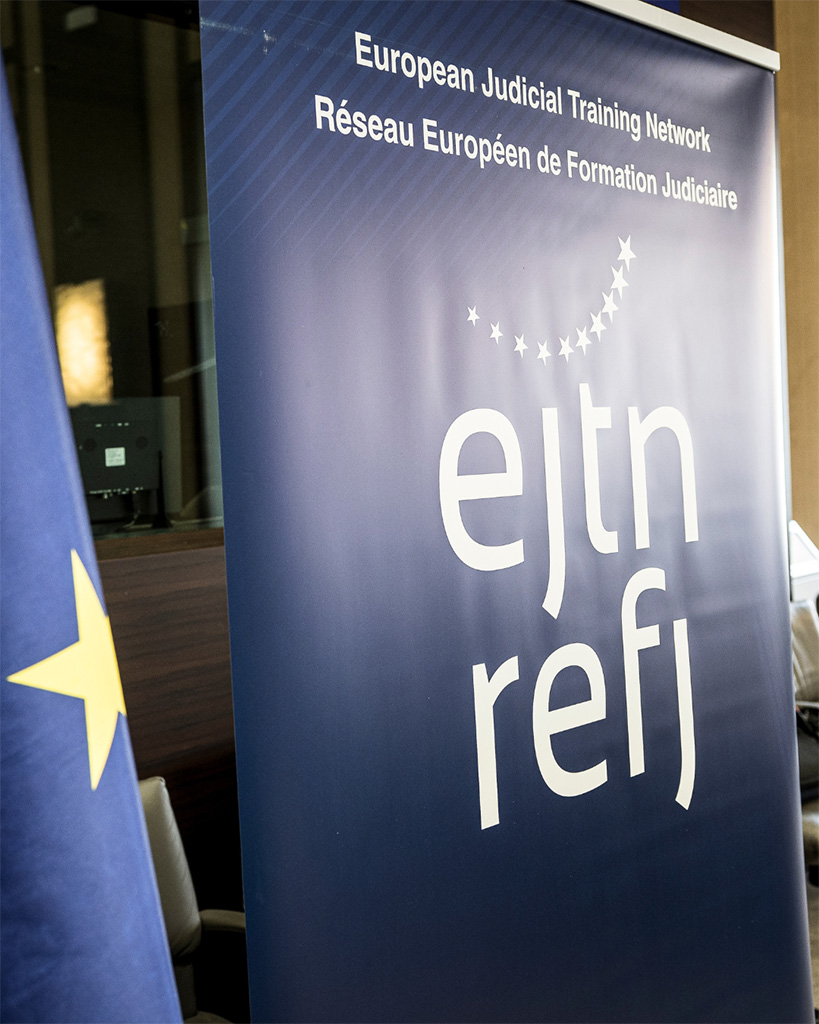Study visits
EJTN study visits have been an opportunity for a first contact with European judicial institutions for a long time. They are organised in various institutions for judges, prosecutors, and court and prosecution staff.
To learn more about the EJTN exchanges, watch our informational video here

–
Court of Justice of the EU
Study visits at the Court of Justice of the European Union have a long-lasting tradition in the EJTN Exchange Programme.
They offer judges, prosecutors, and court staff a first-hand insight in the work of the Court of Justice, as well as the cabinets of judges, advocate generals, and the Research and Documentation Department. Participants follow presentations and a briefing on a case before the Court before taking part in a live court hearing before the Grand Chamber. They also meet their colleagues from all over the European Union and exchange best practices while discussing cases of a European dimension.
To participate in study visits at the Court of Justice of the European Union, you need to be a judge, prosecutor, court/prosecution staff or judicial trainer.
Five study visits are organised during a year, three in the first semester and two in the second one. One study visit is combined with a visit at the European Public Prosecutor’s Office.
European Court of Human Rights
Study visits at the European Court of Human Rights aim at providing a thorough knowledge of the Court, its functioning and its case law. The study visits focuses on:
- Presentations on the Court’s competencies, procedures before the court, and case law
- Attending a court hearing if possible
- Meeting with a judge from the Court
- Presentation of the HELP Programme of the Council of Europe
To participate in study visits at the European Court of Human Rights, you need to be a judge, prosecutor, court/prosecution staff or judicial trainer.
Five study visits are organised during a year, three in the first semester and two in the second one.
Eurojust
The study visit at Eurojust aims at raising the participants’ awareness of the role of Eurojust and its organisation as well as increasing their understanding of the powers given to Eurojust National Members and judicial cooperation instruments in criminal matters.
The study visit may include two additonal institutions: a presentation of Europol gives an overview of the work of the European Union Agency for Law Enforcement Cooperation to the participants; a visit to the headquarters of the International Criminal Court allows the participants to discover the work of this major international institution and to know more about the concrete functioning of international justice.
To participate in a study visit at Eurojust, you need to be a prosecutor or investigating judge or a court/prosecution staff working with criminal issues.
One study visit is organised during a year.
FRA/UNODC
The study visit at the EU Agency for Fundamental Rights aims at introducing the participants to the EU Charter of Fundamental Rights and the work of the agency in the area of Non-Discrimination, LGBTI, Access to Justice, Asylum and Migration, Hate Crime, the Rights of the Child and Data Protection. In small groups, participants have the opportunity to work on a case study while exchanging best practices with their European colleagues which gives the study visit a valuable social component.
A complementary visit to the United Nations Office on Drugs and Crime in the historic Vienna International Center may be organised to provide for an international view on crime prevention and criminal justice in Hate Crime, Discrimination, and Human Rights cases.
To participate in a study visit at the EU Agency for Fundamental Rights, you need to be a judge, prosecutor, court/prosecution staff or judicial trainer.
One study visit is organised during a year.
EU institutions
The study visit with the EU institutions in Brussels is organised with the European Commission, the Council of the European Union, the European Parliament and the European Anti-fraud Office (OLAF). The study visit is designed to provide beneficiaries with an insight into the EU law making process and the host institution’s functioning and procedures. The role of OLAF is also be explained.
To participate in study visits in EU Institutions, you need to be a judge, prosecutor, court/prosecution staff or judicial trainer.
Two study visits are organised during a year.
Hague Conference on Private International Law
The study visit at the Hague Conference on Private International Law aims at giving an insight to family judges of the EU Member States about the main instruments of the Conference (Conventions, Protocols and Principles) in the area of international family law. The visit covers the Conventions on the civil aspects of international child abduction, the protection of children and cooperation in respect of intercountry adoption, the jurisdictions applicable law, recognition, enforcement, cooperation in respect or parental responsibility and measures for the protection of children, the international recovery of child support and other forms of family maintenance as well as the protocol on the law applicable to maintenance obligations. The visit also provides for EU law perspective and relations between The Hague Conventional system and the EU law system.
To participate in a study visit at the Hague Conference on Private International Law, you need to be a family law judge, a prosecutor working with family-law issues or a court staff working with family-law issues.
One study visit is organised during a year.
European Public Prosecutor's office
The study visits at the European Public Prosecutor’s office (EPPO) are organised according to two different format:
- A general study visit, combined with visits to the Court of Justice of the EU. This visit includes general presentations on EPPO and its mandate, as well as a short case study involving EPPO’s competence. The study visit lasts one day and is organised in combination with a study visit to the Court of Justice of the EU.
To participate in a general study visit at the European Public Prosecutor’s office, you need to be a judge, prosecutor, court/prosecution staff or judicial trainer.
One general study visit is organised during a year combined with the study visit at the CJEU.
- A specialised study visit for investigative and criminal law judges and prosecutors working on financial crimes.
One specialised study visit is usually organised during a year.
Interested in a study visit?
The call for applications for study visits of the first half of the year is now open until 17 December 2025 (18:00, Brussels time) on the EJTN Exchange Programme platform.
The call for applications for study visits of the second half of the year are from mid-April to mid-May.
Applicants are preselected by the EJTN Members and Associate Members. Preselected applications are then allocated by the EJTN secretariat.

